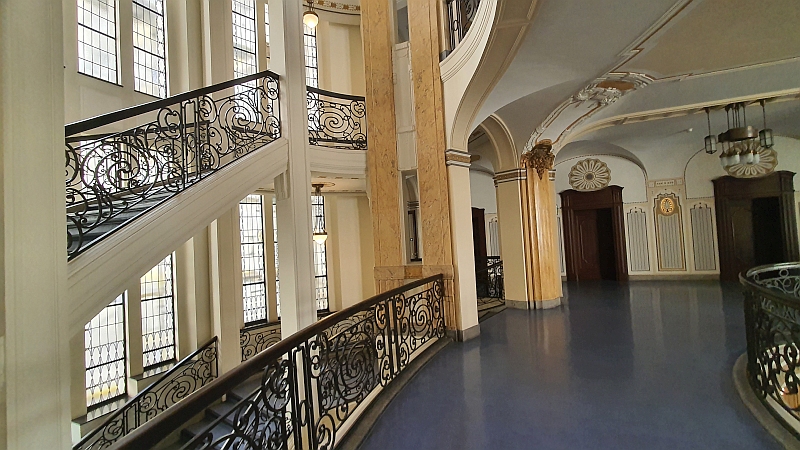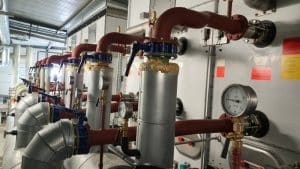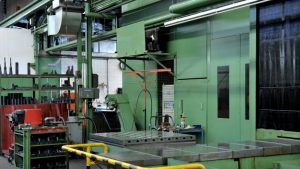What is this article about?
Expert opinions in court in mechanical engineering play a central role in technical disputes – whether for clarifying causes, responsibilities, or the extent of damages. Especially in a court context, they are often crucial to the outcome of a case. However, although the requirements for publicly appointed and sworn court experts are high, the fees awarded to them are disproportionate to the work they perform on behalf of the parties.
This article examines why court-appointed expert witnesses in mechanical engineering are often underpaid under the Judicial Remuneration and Compensation Act (JVEG), the specific financial and organizational hurdles experts must overcome, and how this can affect the quality and availability of experts. Using real-life case studies and in-depth analysis, it demonstrates why many experts in mechanical engineering are increasingly avoiding court-appointed work and preferring to work for parties.
Expert opinions in mechanical engineering: When are they necessary?
An expert opinion in mechanical engineering is indispensable in various situations. As a rule, expert reports are commissioned by three different clients:
- Industrial companies or commercial companies: commission for different reasons and at different times. These may concern questions when initiating a technical-legal dispute. It can also be after a technical problem occurs or when technical aspects are being clarified when the company is confronted with technical and legal allegations.
- Insurance companies usually commission after the damage has occurred. This often involves the key points of cause, responsibility and the amount of damage.
- Courts commission this if there is a decision to take evidence and technical issues in the field of mechanical engineering, machines and technically related areas are to be clarified in a binding manner as part of a legal dispute or an independent evidentiary procedure .
You can find an overview of some topics here:
Expert opinions on prices in court orders according to JVEG in mechanical engineering
The costs for expert reports for courts are calculated according to JVEG.
The JVEG is a German law that regulates the remuneration and compensation of persons who work within the framework of the judiciary, in particular experts, interpreters, witnesses and other persons who act on behalf of the judiciary.
The JVEG sets out the principles and rules for the remuneration of these people who, for example, appear as experts in court, testify as witnesses or act as interpreters.
It contains detailed provisions on the level of remuneration, travel costs, expenses and other aspects that must be taken into account when compensating people in the context of justice.
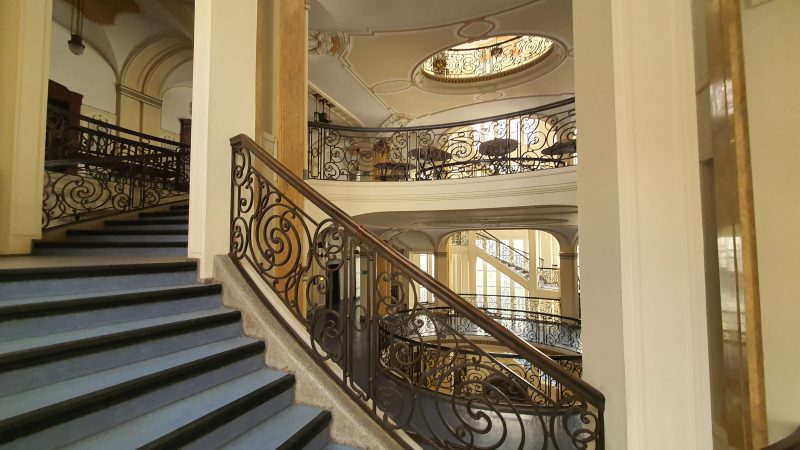
JVEG
The current Judicial Procedure Act (JVEG) dates from April 2025 and entered into force on June 1, 2025. The judiciary has taken into account a so-called “judicial discount” of 5%, arguing that the state is “a good client.”
The legislature wants experts to bill their time expenditure to the minute.
Hourly rates for expert reports in court
The costs for expert reports in court in mechanical engineering are therefore based on hourly rates that are too low.
The different hourly rates for the many subject areas are contained in “Annex 1 to Section 9 Paragraph 1 Sentence 1 JVEG”.
Hourly rate for “machinery and systems”
According to Section 24.4, including the judicial discount, the hourly rate valid since June 2025 is €142.00 net. This rate is significantly lower than for expert opinions for industry, commercial enterprises, and insurance companies.
Additional costs
The following will continue to be paid:
- reimbursement of travel expenses,
- Flat rate per kilometer when traveling with your own or rented car,
- parking fees,
- Rail for the use of 1st carriage class and all associated costs as well as the costs of using public transport;
- Hotel costs if an overnight stay away from home is necessary;
- Reimbursement for other expenses such as
- Costs of necessary representatives and necessary accompanying persons,
- Making copies and printouts,
- …
Price increases and JVEG
Figure 1 shows the increases in consumer prices with reference to the data of the Federal Statistical Office for consumer prices in Germany ( © Federal Statistical Office (Destatis), 2025 | Status: 10.07.2025 / 08:03:45 ).
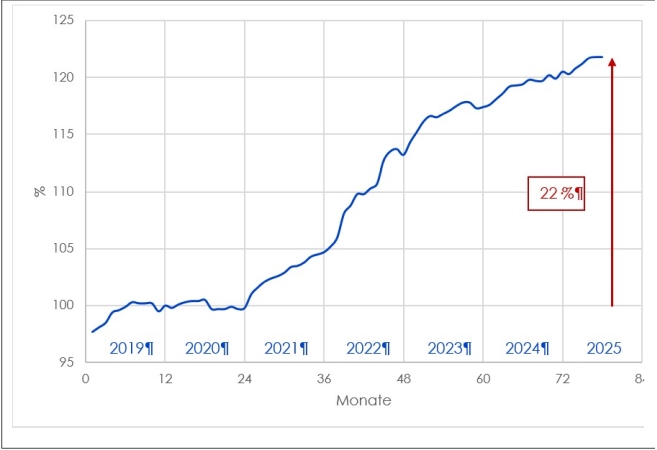
It can be seen that consumer prices and, of course, price increases for office, personnel and ancillary costs have risen significantly since 2021, by over 20% compared to the 2020 baseline, comparable to the beginning of 2021.
Before the amendment, effective June 1, 2025, the hourly rate for court experts in mechanical engineering was €130.00 net. With the amendment to the JVEG, this hourly rate was increased by €12.00 net. This corresponds to a 9% increase. The actual increase in consumer prices is more than twice as high.
In relation to real price increases, court experts from the mechanical engineering sector are now working on behalf of the court for less fees than they did four years ago.
Summary court hourly rate
The hourly rate for court experts in mechanical engineering according to the German Judicial Review Act (JVEG) has been increased, but not to the extent that there have been real price increases since the last increase in 2021. Therefore, expert work on behalf of the court remains less attractive than commissions on behalf of parties (industry, business in companies, insurance companies).
For this reason, most experts also make an application for an increased hourly rate in accordance with JVEG § 13 para. 1 or paragraph. 2 for the “expert opinion court” assignment or are primarily employed by commercial enterprises, industrial companies and insurance companies.
Cost estimates by the court are almost always wrong
An expert opinion with on-site inspection in mechanical engineering and/or regarding a machine problem can be commissioned by a court for a regional court or a higher regional court
not for gross 3,000.00 €
be refunded.
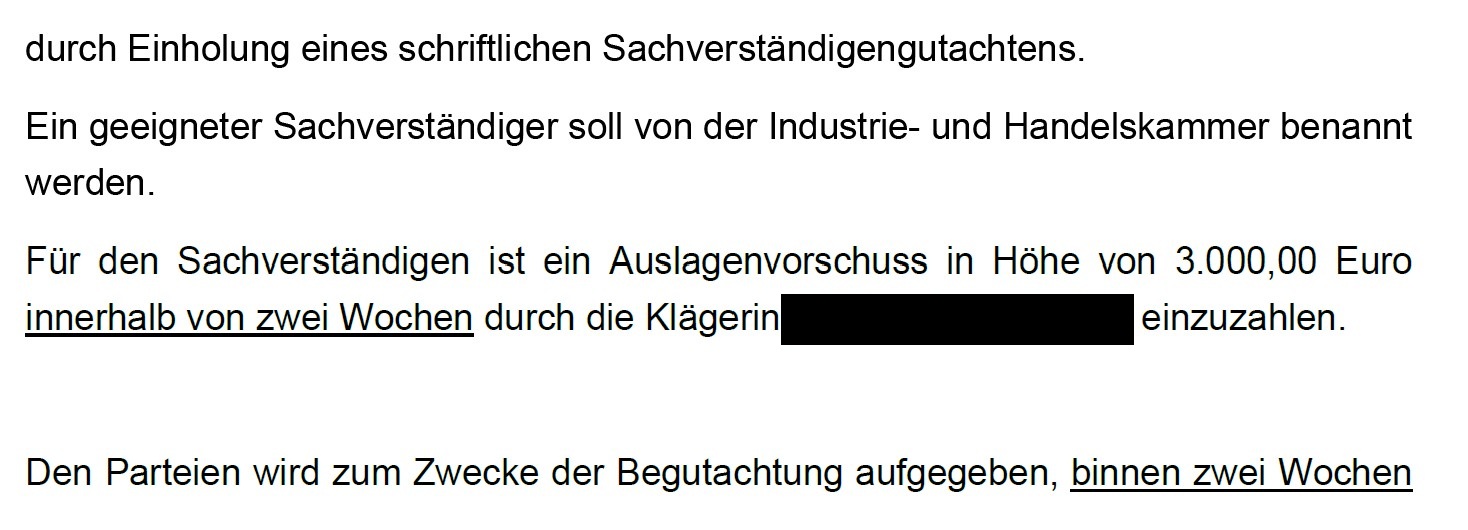
This problem does not arise for local courts, since legal disputes in the field of mechanical engineering usually have a value in dispute of more than €5,000.00, so that a legal dispute must take place before the competent regional court and a local court is not even an option.
Key cost factors for expert reports in court
Courts always collect an advance payment from the parties, including VAT. In the example shown in Figure 2, this means that the relevant net amount for the court expert, at 19% VAT, is only €2,521.00 net.
Necessary work steps in the court order for court experts
When appointed by a court, court experts must always carry out the following steps:
- Reading the file and checking whether the expert opinion assignment can be completed.
- Examination of whether the advance payment obtained is sufficient, which is almost never the case without prior consultation between the court and the expert.
- Organization of an on-site meeting with
- summoning the parties to the appointment in a timely manner,
- if necessary, request for additional information,
- Study this additional information before the on-site visit and
- Preparation of the on-site hearing with reference to the questions in the order for evidence.
- Arrival and departure for the on-site appointment, including hotel accommodation if necessary.
- Conducting the on-site visit.
- Documentation of the on-site visit.
- Answering the questions in the order for evidence, taking into account the findings of the on-site hearing and, if necessary, researching some aspects of the court’s questions.
- Completion of the written report with proofreading.
- Either the report can be sent in the desired number of originals or – fortunately now possible – electronic transmission of the report via the justice portal.
Furthermore, it must be considered that a court order always involves a significant administrative effort. Both parties must always be informed simultaneously. The flow of information must always be ensured in all directions (plaintiff, defendant, court) to ensure that the court-appointed expert is not vulnerable to challenge after the report has been completed.
If one imagines the process required for court expert opinions, even a layperson can see that in almost all cases an expert opinion in mechanical engineering cannot be obtained for a gross fee of €3,000.00.
For the advance payment obtained in the above example, this would mean a total of only 17 working hours without taking into account additional costs, travel expenses, hotel costs and other incidental costs.
In the above example, however, 18 questions of the order for evidence alone had to be answered. Since the questions of the order for evidence in court reports cannot be answered simply with “yes” or “no,” but rather require substantiated answers, it becomes clear how unrealistic the advance payment obtained in the above example is.
Problems for parties
An initial advance payment requested by the court that is too low can be problematic for the parties. Expert witnesses usually indicate the amount of advance payment required before commencing their work and after reading the case file, which, of course, is subject to a fee.
However, if the parties knew as precisely as possible in advance what costs to expect, many legal disputes would be settled without expert reports commissioned by the court.
Examples: Fee reductions in court
Courts frequently reduce the fees of court-appointed experts. I’ve had many a “nice” phone call with cost officers.
Example 1: Reductions by cost officers after expert opinion court
For about two years now, it has been possible to submit expert opinions electronically to the authorities. This makes the process more efficient. Until this option was introduced, courts always required a certain number of original reports. This involved additional costs for the number of images, the number of pages, and even the written characters.
In the past, it was quite “exciting” how cost officials dealt with the provisions of the JVEG (Federal Court of Appeal) regarding ancillary costs. This sometimes varied from state to state.
For example, I once received a call from a cost officer. He informed me that €1.60 had to be deducted for postage because the postage costs for one letter couldn’t be included. In the end, the whole thing was justified in writing and sent by mail.
This was certainly more expensive overall than the original cost of €1.60.
Example 2: Cheap expert opinion court from the mechanical engineering sector
It is always the case that courts, when commissioning a written expert report, refer to the advance payment obtained at the end of the order for evidence when issuing the order (Figure 2).
In July 2024, I received a summons to a hearing with the phrase ” Explanation of the Expert Report .” The date was clearly stated in the summons. There was no explicit reference to the advance payment of costs in the summons to the hearing. This is normal, even with 25 years of experience as a court expert.
In preparation for a hearing to explain the expert report, the following steps are necessary:
- Rereading the case.
- Reading the written submissions of the lawyers of the parties to the dispute.
- Prepare for the partially new questions raised in the lawyers’ pleadings.
- Re-examination of the evidence order, which was the basis for the written report.
- Arrival at the hearing, the time of the hearing and departure from the hearing.
- In some cases, there may also be overnight costs if the venue cannot be reached on the same day for arrival and departure or if the hearing is scheduled very early.
Neither in a summons nor elsewhere explaining an expert opinion has an advance payment for the hearing ever been mentioned in my cases. My colleagues have never experienced anything like this either. I’ve never had any problems with other courts after invoicing the costs following a hearing. The usual practice so far: As a court expert, when summoned to a hearing, you prepare, travel there, attend the hearing, travel back, and bill the costs incurred according to the Judicial Procedure Act (JVEG).
In the present case, the fee was reduced from €2,172.63 gross to €800.00 gross.
The reasoning of the district auditor, the regional court and, following my appeal, the competent higher regional court in Hamm was:
In its ruling of April 22, 2025, the Arnsberg Regional Court pointed out that the court order expressly stated that €800.00 had to be paid for the expert witness. This order did indeed exist. In my view, it was addressed to the parties and not to me, especially since I had a separate summons to explain the expert report, including all necessary additional information (time, place).
In fact, the order was overlooked several times. This is also due to the paperwork involved in working with this regional court. Despite the possibility of sending electronically, the court sent conventional mail with a lot of additional information. However, since
never
When summoned to a court hearing, an advance payment for costs was listed in previous court cases, there was a corresponding lack of sensitivity in this regard. This would ultimately prove to be a disadvantage.
There was no indication that I, as an expert witness, would have to take any action if I appeared in court as summoned.
If the summons had explicitly referred to the consideration of an advance payment of costs and if the court had been clearly informed, as was the case when a written court report was ordered in the order for evidence, it would of course have been immediately apparent that it was not possible to appear at this hearing for €800.00 gross.
It was necessary to prepare for the appointment, familiarize oneself with the facts, and travel from Hanover to Arnsberg and back. Due to the early date in January 2025 and the weather conditions, an overnight stay was even necessary.
It is even now completely impossible to travel from Hanover to Arnsberg and back for a hearing as a court-appointed machine expert with reference to the JVEG for a gross fee of €800.00.
| POS | What | Hours | Minutes | Total |
|---|---|---|---|---|
| 1 | Car travel costs | 179,76 € | ||
| 2 | Outward journey | 2 | 43 | 353,17 € |
| 3 | Return journey | 2 | 43 | 353,17 € |
| net | 886,09 € | |||
| VAT | 19% | 168,36 € | ||
| Gross | 1.054,45 € |
Since experts are generally paid according to their time and effort, no professional expert can afford to give away their fees, as time can only be sold once and experts are not paid based on the value of the case, as is the case with lawyers, for example.
Therefore, every expert who performs this work full-time has a strong interest in being compensated for their time. After all, staff and office costs also need to be financed.
The problem in this case is clearly as follows for me:
- It was not apparent that only €800.00 was available and
- The court did not request that any advance payment of costs be considered.
Nevertheless, the regional court in question and the competent higher regional court in Hamm as the appeal court saw the facts differently.
In this case, in terms of time and travel expenses, I ended up with an hourly rate that, due to the reductions, was lower than the costs that our private plumber charges his apprentice for auxiliary work during a renovation.
This was a bitter experience in working with the courts.
If the hourly rates charged by courts are generally lower than those charged by parties to companies, and if significant reductions (in this case, 63%) are sometimes made by cost officers, the question arises whether court-appointed professional experts in mechanical engineering really make sense. Professional experts are entrepreneurs and have an interest in being appropriately compensated for their work.
Court assignments can be fun if the subject matter is an exciting (technical) topic. However, cost-cutting can ruin any fun, even if the topic is interesting.
I have learned to be
any activity for courts
so now especially with the
summons to negotiations,
to send a cost estimate to the court before the hearing and then wait for the court’s notification that the necessary advance payment for a summons to the hearing has also been made.
Conclusion and final thoughts
This article provides a thorough and critical examination of the cost structure for expert reports in mechanical engineering when they are commissioned by a court. It demonstrates that the remuneration under the Judicial Remuneration and Compensation Act (JVEG) is significantly lower than the standard market fees paid, for example, by industrial companies or insurance companies.
A central problem lies in the courts’ blanket and often unrealistically low cost estimates, which contradict the actual workload of an expert witness commissioned by the court. A concrete case study involving significant cost reductions in court expert reports illustrates how ambiguous communication between the court and a publicly appointed and sworn expert can be and the resulting financial risks.
The article makes it clear: Despite rising living and operating costs, the increase in court hourly rates has remained below the price increases. At the same time, bureaucratic hurdles are increasing, and courts may reduce fees. This situation is making work for court-appointed experts in mechanical engineering increasingly unattractive.

